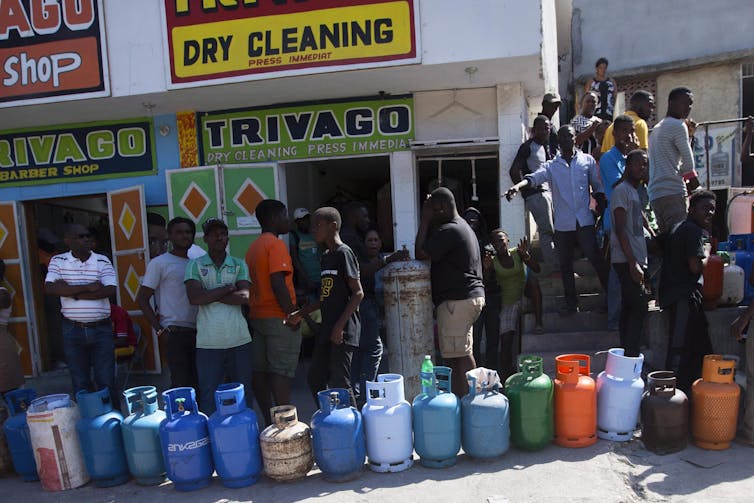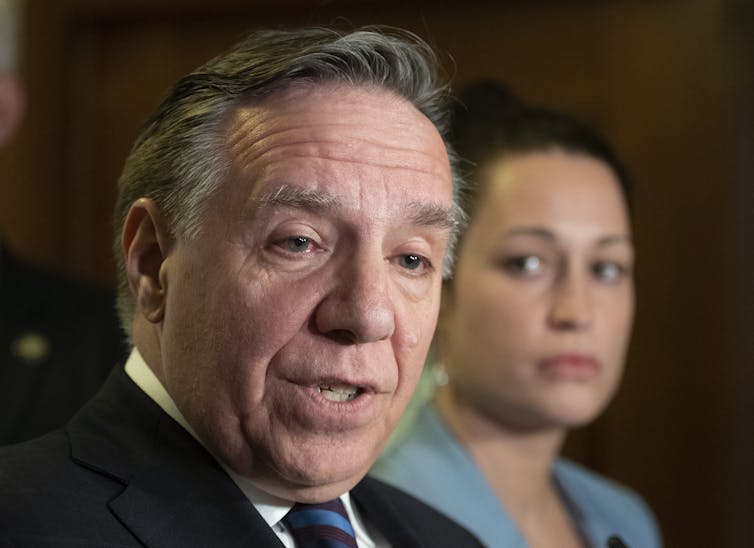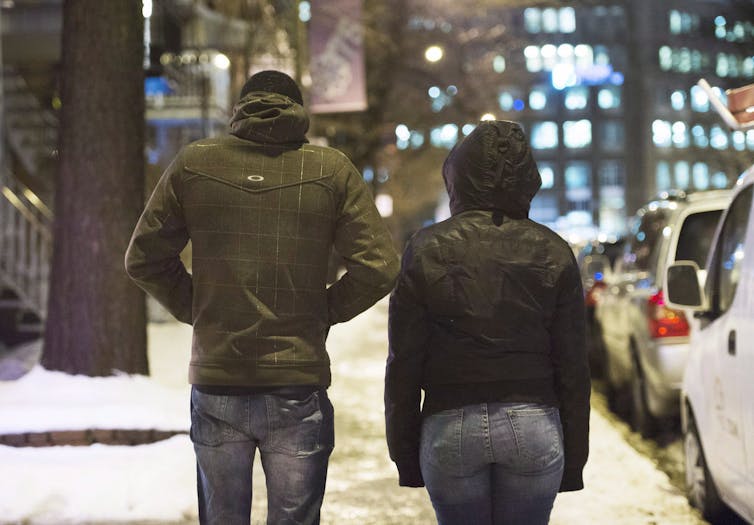Québec’s Trump-like immigration policies contradict Canada’s welcoming image

Prime Minister Justin Trudeau meets with Québec Premier François Legault in Janurary 2019. Paul Chiasson/ The Canadian Press
BY Carlo Handy Charles
February 28, 2019
Two weeks ago, the Canadian government temporarily halted deportations to both Venezuela and to Haiti as violent protests continued in major cities in both countries.
Haiti is a country still recovering from the devastating 2010 earthquake, a cholera epidemic and the 2016 Hurricane Matthew, among other pressing issues.
This vulnerability of the Haitian population has for decades caught the attention of the international community, which has funnelled billions of dollars in aid through NGOs, making Haiti the home of the world’s highest number of NGOs per capita and driving its population’s need to emigrate.

Canada’s decision reaffirms its commitment to protecting the most vulnerable individuals and reinforces its international image as a world leader in protecting and resettling refugees.
Canada stands in contrast to the recent reputation of the United States with its protectionist economic nationalism, as well as anti-immigration policies.
Since President Donald Trump and his administration entered the White House, international perception of the U.S. has shifted from the land of immigrants to a hostile and unsafe country for refugees and migrants.
But what are the implications of these temporary suspensions for Haitians who live in the current anti-immigration climate of the province of Québec?
The difference between Québec and the federal government reveals significant contradictions between levels of migration governance in Canada. As well, it reveals how migrants and refugees are still perceived and thought of in terms of race and ethnicity.
CAQ’s new policies
Since the Coalition Avenir Québec (CAQ) government came to power in Québec last year, Premier François Legault has announced his plans for immigration cuts and an open preference to attract and recruit more immigrants from France and other European countries.
The CAQ government recently cancelled a total of 18,000 applications for immigration, including more than 3,000 applicants already living in Québec. CAQ says the proposed system, which they refer to as “Tinder of Immigration”, in reference to the dating app, will be efficient because it matches applicants with labour needs.

The CAQ’s preference for European and French citizens can be interpreted as the perpetuation of systemic racism in Québec. There, immigrants have a triple rate of unemployment compared to those native-born.
CAQ’s plan includes a prioritization of French citizens and French speakers. Legault says there are already too many immigrants in Québec that do not speak French. He also says they do not qualify as the skilled workers Québec needs.
In response to the charge of racism, Legault has said that his priority is purely economic. He wants to increase investments from French companies in Québec.
In so doing, the CAQ government aligns itself with the growing protectionist-economic discourse in the U.S. and Finland, where immigrants and refugees appear not to be welcomed, ostensibly so jobs are protected for native-born citizens.
How immigrants are perceived
Research conducted in Ontario shows that negative ideas of refugees and migrants are informed by stereotypical perceptions of their race and ethnicity in a host country. This concept is called ethnoracialization: a place welcomes desirable individuals and excludes “undesirable” people who are perceived as not belonging.
Similar to Trump’s alleged description of migrants from Haiti, El Salvador and other African nations as “shithole countries”, Legault perceives French and other European nationals as desirable and deserving as migrant candidates. He constructs non-European immigrants and refugees as undesirable and unworthy.

Although data shows that immigrants from Haiti and El Salvador are among the top applicants accepted through the Canadian merit-based point immigration system, Legault’s plan revives old perceptions of non-European immigrants as unworthy of immigrating to Québec.
Haitians lose with Québec’s new policies
International Refugee Board hearings take place in the province where people make their refugee claims. That same province is responsible for providing services, such as access to social assistance, education, health services, emergency housing and legal aid while a decision is pending on their claim.
Legault’s statements and his new immigration plan may have negative impacts on Haitians who currently live in Québec – whether as asylum seekers, settled refugees or landed immigrants.
Some issues identified include the difficulty to renew short-term work permits. This arduous bureaucracy is time consuming, costly and can cost Haitians job opportunities, and decrease access to health care services.
Another concern is the health of the asylum seekers. A recent study I worked on with Jude Mary Cénat on Haitian asylum seekers in Québec shows that the process of applying for asylum has significant consequences on one’s mental health. The anxiety of deportation and other potential negative outcomes raises significant health issues.
The new policies in Québec may result in considerable difficulties getting asylum applications recognized as legitimate. It may mean that matches will be difficult to find for Haitian immigrants in the new “Tinder Immigration System” as they are not generally seen as desirable or qualified.
As the federal government aims to protect the safety of Haitians by allowing them stay in Canada temporarily, we must look at the short and long-term impacts of Québec’s hostile immigration program on Haitians’ sense of safety.![]()
Carlo Handy Charles is a teaching assistant and PhD candidate in sociology at McMaster University. This article is republished from The Conversation under a Creative Commons license. Read the original article.


